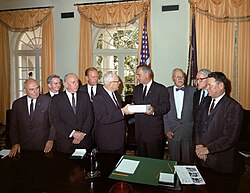Warren Commission
The President's Commission on the Assassination of President Kennedy, known unofficially as the Warren Commission, was established by President Lyndon B. Johnson on November 29, 1963.[1] Its purpose was to investigate the assassination of United States President John F. Kennedy that had taken place on November 22, 1963.[2]
Commission report
The Commission took its unofficial name—the Warren Commission—from its chairman, Chief Justice Earl Warren.[3] According to published Transcripts of Johnson's presidential telephone conversations, some major officials did not want to form this commission.[4] Also that several commission members took part only reluctantly.[4] One of their chief reservations was that a commission would create more controversy and people's fears would be proved valid.[4]
The 88th U.S. Congressional session passed Senate joint resolution 137 authorizing the Presidential appointed Commission to report on the assassination of President John F. Kennedy.[5] Its 889-page final report was presented to President Johnson on September 24, 1964.[6] It was made public three days later.[7] It concluded that President Kennedy was assassinated by Lee Harvey Oswald.[8] They also stated that Oswald acted entirely alone.[8] The commission said that Jack Ruby also acted alone when he killed Oswald two days later.[9] The Commission's findings have proven controversial. They have been both challenged and supported by later studies.
Members
- Committee
- Earl Warren, Chief Justice of the United States (chairman) (1891–1974)
- Richard Russell, Jr. (D-Georgia), U.S. Senator, (1897–1971)
- John Sherman Cooper (R-Kentucky), U.S. Senator (1901–1991)
- Hale Boggs (D-Louisiana), U.S. Representative, House Majority Whip (1914–1972)
- Gerald Ford (R-Michigan), U.S. Representative (later 38th President of the United States), House Minority Leader (1913-2006)
- Allen Welsh Dulles, former Director of Central Intelligence and head of the Central Intelligence Agency (1893–1969)
- John J. McCloy, former President of the World Bank (1895–1989)
- General counsel
- J. Lee Rankin (1907-1996)
Warren Commission Media
The Warren Commission on 14 August 1964.
The Warren Commission presents its report to President Johnson. From left to right: John McCloy, J. Lee Rankin (General Counsel), Senator Richard Russell, Congressman Gerald Ford, Chief Justice Earl Warren, President Lyndon B. Johnson, Allen Dulles, Senator John Sherman Cooper, and Congressman Hale Boggs.
The Warren Report reproduced in book form by the Associated Press
WC Vol18 CE903 SBT alignement
- Richard RussellJr.jpg
Former United States Senator and President of the U.S. Senate Richard Russell, Jr.
- JohnShermanCooper.jpg
John Sherman Cooper taken from the US Congress Biographical Directory.
- Hale Boggs.png
US Congressman Hale Boggs
- Representative Gerald R. Ford, Jr. with his Sports Illustrated Silver Anniversary Award - NARA - 7064481.jpg
Representative Gerald R. Ford, Jr., poses with his Sports Illustrated Silver Anniversary Award. December 21, 1959.
- Allen w dulles.jpg
Allen Dulles
References
- ↑ Peters,Gerhard; Woolley, John T. "Lyndon B. Johnson: "Executive Order 11130 - Appointing a Commission To Report Upon the Assassination of President John F. Kennedy," November 29, 1963". The American Presidency Project. University of California - Santa Barbara. Archived from the original on December 4, 2017. Retrieved November 4, 2015.
- ↑ Baluch, Jerry T. (November 30, 1963). Warren Heads into Assassination. p. 1.
- ↑ Morris, John D. (November 30, 1963). Johnson Names a 7-Man Panel to Investigate Assassination; Chief Warren Heads It. p. 1.
- ↑ 4.0 4.1 4.2 Beschloss, Michael R. (1997). Taking charge: the Johnson White House tapes, 1963-1964. New York: Simon & Schuster. https://archive.org/details/takingcharge00mich.
- ↑ "Joint resolution authorizing the Commission established to report on the assassination of President John F. Kennedy to compel the attendance and testimony of witnesses and the production of evidence - P.L. 88-202" (PDF). U.S. Government Printing Office. December 13, 1963.
- ↑ Mohr, Charles (September 25, 1964). Johnson Gets Assassination Report. p. 1.
- ↑ Roberts, Chalmers M. (September 28, 1964). Warren Report Says Oswald Acted Alone; Raps FBI, Secret Service. p. A1.
- ↑ 8.0 8.1 Lewis, Anthony (September 28, 1964). Warren Commission Finds Oswald Guilty and Says Assassin and Ruby Acted Alone. p. 1.
- ↑ Pomfret, John D. (September 28, 1964). Commission Says Ruby Acted Alone in Slaying. p. 17.

